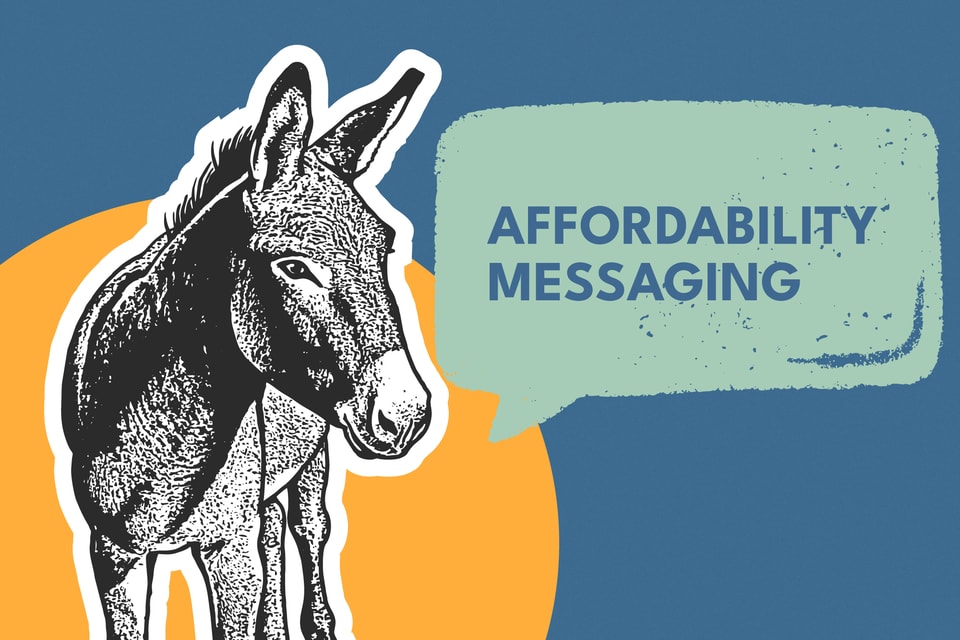Memo Published October 16, 2025 · 5 minute read
Democrats Are Starting to Get It On Energy Costs
Emily Becker

Earlier this year, former Washington Governor Jay Inslee argued that the key to winning back young Trump voters was to “Democrats must embrace the virtues and benefits of clean energy and the need to defeat climate change.” But as Democrats grapple with the One Big Beautiful Bill Act and the Trump Administration’s war on clean energy, many party messengers are finally coming around to the fact that persuadable voters aren’t influenced by moral arguments about the need for or benefits of combating climate change. Simply: Inslee’s strategy just won’t work to win back a majority in the Senate and retake the House.
The United States is smack in the middle of a major affordability crisis—and energy prices are soaring. Most voters can’t afford to switch to solar, get an EV, or otherwise change their consumption habits. Many can barely pay their existing utility bills. But Democrats’ energy messaging has been solely focused on climate and environmental virtue signaling for years. The results are clear: voters don’t believe Democrats support affordable energy production, and they don’t trust the party to lower their household costs.
If the goal is to bring voters into the tent, Democrats need to prove they’re serious about lowering energy bills. If we hope to grow clean energy deployment, we need to help voters understand that a diverse supply of energy will bring down costs and increase reliability. We can do both by truly embracing an all-of-the-above energy strategy and putting a stop to moralistic arguments about the environmental virtues of clean energy.
Many Democratic leaders recognize this need and are embracing a new messaging approach that is squarely focused on affordability and reliability and positions clean energy as one piece of a diverse energy mix that meets rising demand and cuts costs for working people. By diversifying our energy production to include and embrace clean energy sources, we can help voters see the ways clean energy improves their lives in tangible ways.
This is the path forward.
Senator Brian Schatz: “The way to victory is to talk about price. You could talk about the planetary emergency and mitigation and adaptation, and you could throw in some environmental justice rhetoric, and by the time you’re done talking, people think you don’t care about them.” [New York Times, September 9, 2025]
Representative Scott Peters: “For the first time in decades, America faces a massive increase in energy demand, due to AI data centers, onshoring manufacturing, and the electrification of our economy. We need affordable power, good-paying jobs, and reliable service – abundant clean energy is the answer. [Press Release, July 9, 2025]
Senator Martin Heinrich: “We’re in a constrained supply environment and an increased demand environment. People’s electricity bills all over the country are going to go up. What I can guarantee you is that in the next election and the election after that, Republicans are going to own increased energy prices.” [Politico, June 10, 2025]
This moment demands pragmatic messages focused on affordability. That means many important issues – from climate change to animal protection to other moral injustices – won’t find a home in an effective Democratic message. It doesn’t mean these issues aren’t real. It simply means we must have other priorities if we want to win competitive elections.
Not every Democrat is modeling the effective messaging that will grow the coalition, including some who’ve long prioritized affordable, clean energy in legislation.
The language above stands in stark contrast to the language used below, and reflects an important rhetorical shift that more Democrats need to embrace if we want to convince persuadable voters that our party has a plan for affordable energy.
Senator Sheldon Whitehouse: “Behind nature’s test looms a moral test. Do we let the influence of a few wealthy industries compromise other people’s livelihoods, even other people’s lives, all around the planet and off into the future? It is morally wrong, in our greed and folly, to foist that price on all those others. That’s why Pope Francis is bringing his moral light to bear on climate change. To quote him: “There is a clear, definitive and ineluctable ethical imperative to act.” Our human morality is being tested.” [Press Release, May 18, 2025]
Senator Jeff Merkley: “We stand with these courageous young activists in Oregon and across the country who are taking matters into their own hands with immediate and decisive steps to fight for themselves and future generations, address climate chaos, and tackle environmental injustice.” [Press Release, July 16, 2025]
Representative Pramila Jayapal: “Every single one of us — no matter our age, our background, our race, our income — has the right to life, liberty, and the pursuit of happiness. But those rights are in jeopardy because the future of our planet is in jeopardy. [Press Release, July 16, 2025]
Senator Elizabeth Warren: “Just because Donald Trump doesn’t believe in climate change doesn’t mean it isn’t real.” [X, July 11, 2025]
Now is not the time for mixed messaging. Voters’ number one priority is lowering the cost of living, and Democratic messengers need to be laser-focused. We are a party of effective communicators, with deep policy expertise, all of whom can deploy a compelling affordability message.
It’s time for Democrats to focus up and hone an energy message that leads with lower costs, not environmentalism and judgment.
